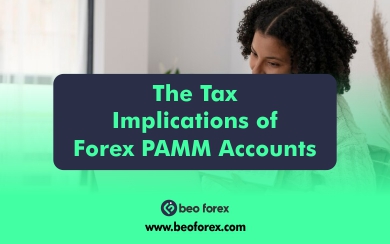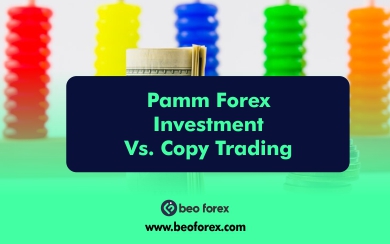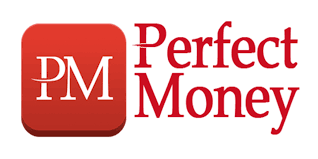Tax Implications of Forex PAMM Accounts can be one of those complicated yet vital subject matters that investors may need to know to better their returns. As more investors turn to Percentage Allocation Management Module (PAMM) accounts, the need to manage associated financial obligations increases. PAMM accounts offer a unique investment opportunity by allowing owners to benefit from professional traders while participating directly in the forex market. With potential profits come tax obligations, which can significantly impact overall earnings. Understanding these tax ramifications is essential for both professional traders and beginners to maximize their investments while remaining compliant with tax laws. This article addresses the taxation of forex PAMM accounts and outlines what investors need to know to make informed asset management decisions.
Understanding Forex PAMM Accounts
The PAMM account is managed by a professional trader, the PAMM manager, who makes all trading decisions on behalf of the investors. These managers usually have a great and fantastic history in forex trading, and they use this expertise to maximize their profits. This will impact not only his earnings but also the investors’ directly from his performance.
Investors invest capital into the PAMM account, which is then cumulatively traded. An investor’s share of profit is directly proportional to the amount that investor initially put in. That is, if an investor provides 10% of the total capital, for example, he also receives 10% of the net profits. With this structure, the interests of both the PAMM manager and the investors are aligned in a manner that highly incentivizes the manager to achieve maximum returns.
Types of Income Generated In PAMM Account
- Trading Profits: The highest return that a PAMM account could bring in is the revenue from trading profit through the activities of a manager himself. Investors share in the profits according to the size of their contributions, making this one of the most attractive features of PAMM accounts.
- Management Fees: Most of the PAMM managers take some management fees, which are either a fixed percentage or a flat rate that has been deducted from the profits before giving them to the investors. These are fees to cover services and expertise provided by the manager.
- Performance Bonuses: In addition to the management fee, a specific performance bonus is paid to the PAMM managers depending on the profits that the account earns above a predetermined level. This method of paying a bonus allows the manager to receive more when the returns are higher; hence, it aligns his goals with those of the investors.
General Tax Principles for Forex Trading
1. Capital Gains vs. Ordinary Income
- Capital Gains: Normally, profits made from the selling of currency pairs are considered capital gains. These could either be short-term. Each of these gains has different tax rates. Short-term gains are subjected to ordinary income rates while the rates for long-term gains might be lower.
- Ordinary Income: Gains are to be characterized as ordinary income, if trade is operated as a business or done on a frequent amount. Profits that come under this category are considered for normal income tax rates.
2. Tax Residency and Its Consequences
- Identifying the Status of Tax Residency: Tax residency may be based on the basic presence of an individual in countries or might even rely on citizenship. Knowing about your tax residency can always assist you in understanding how to be compliant with taxation laws.
- Taxation Implications for Overseas Investors: Overseas investors face several issues related to variations in tax regimes or incidences of withholding taxes. Tax treaties may provide exemption or concession in the tax rates.
Tax Implications Specific to PAMM Accounts
Overview of Tax Responsibilities
PAMM accounts also come with some investment opportunities and, consequently, with some tax considerations that an investor should be aware of. Profits derived from a PAMM account are normally taxable as income and labeled as either capital gains or ordinary income. Investors should report in their tax returns their share in the trading profits, and for that purpose accurate records of their contributions and distributions are required.
Management Fees and Performance Bonuses
This is because PAMM managers may deduct their management fees from taxable income as a business expense. However, investors must pay income taxes on performance bonuses given to a PAMM manager, which increases their overall tax liability.
Withholding Taxes and International Considerations
Withholding taxes applicable on the profits booked in PAMM accounts by international investors can have an impact on net returns. These may, again, be different due to tax treaties between two countries, some of which may provide opportunities for tax relief. Thorough familiarity with such tax implications is quite necessary on the part of PAMM investors for maintaining compliance and optimizing their respective tax strategies accordingly.
Strategies for Tax Efficiency
1. Understand Your Tax Obligations
First and foremost, understand the specific tax obligations as related to PAMM accounts. One should familiarize himself with how profit, management fee, or performance bonus are taxed in his jurisdiction. This will go a long way in planning and could also help avoid surprises at the end of the tax year.
2. Keep Detailed Records
Keep records of every transaction, contribution, and distribution made in order to report your tax obligations accurately. Good record-keeping will make the process of submitting your taxes far easier, and will also be needed documentation if audited.
3. Take Advantage of Tax Deductions
Take advantage of the available deductions with a PAMM account. In general, the management fees that you pay to PAMM managers are deductible as a business expense. Knowing what you can take as a deduction may greatly lower your taxable income.
4. Consider Tax-Loss Harvesting
If you incur any losses in the PAMM account, then consider using tax-loss harvesting strategies. You do this by selling off poor-performing assets to offset gains in other investments and lower your tax liability.
5. Consider Tax-Efficient Investment Vehicles
Research available tax-efficient investment vehicles, such as tax-deferred accounts-applicable to your situation-such as IRAs or retirement accounts. Generally speaking, these accounts make investments that incur taxes on gains, allowing investors to defer these taxes and positively impacting overall after-tax efficiency.
6. Utilize Tax Treaties
Knowing the tax treaties between countries will, for international investors, better help reduce withholding taxes on profits. You could get a tax professional who is familiar with international tax laws to optimize your tax situation when you invest into foreign PAMM accounts.
7. Consult with a Tax Professional
Lastly, an expert in taxes experienced in forex trading and PAMM accounts will be able to develop specific strategies tailored to your financial situation. They can guide you through the complex tax laws and find opportunities for efficiency in taxes.
Frequently Asked Questions (FAQs)
Is the profit gained in PAMM accounts a capital gain?
- Yes, most countries consider profits from PAMM accounts as capital gains.The duration of holding an investment categorizes it as either long- or short-term capital gain. Positions held for less than one year are taxed as short-term gains at ordinary income rates, while those held for over a year qualify for lower long-term capital gains tax rates.
Do I need to report PAMM account income in my taxes?
- Yes, you need to declare your PAMM account income in your tax return. You must declare all gains and losses from PAMM accounts according to your country’s income tax laws. Ensure you maintain proper records of your contributions, distributions, and profit allocations for accurate reporting.
Do I need to consult a tax professional regarding my investments in the PAMM account?
- It’s essential to seek the services of a tax professional, as they can effectively manage your investments in PAMM accounts, particularly if you have significant investments or face international tax issues. A tax expert can give personalized advice that will help you understand your tax obligations and realize various opportunities for tax efficiency relating to your investment.
























